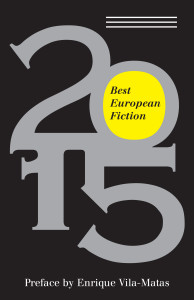 Adda Djørup, ‘Birds’
Adda Djørup, ‘Birds’
Translated from the Danish by Martin Aitken
Teresa, a professor of English, writes to her partner Alejandro to explain why she has gone away without warning. Something like that, anyway:
I should say right away that my story is not an explanation, that I am not even sure myself how it is to be understood. I doubt even that it may be a story at all, for perhaps the beginning does not hang together with the middle, the middle with the end.
Teresa is not quite sure what has happened; but something changed in her when she started spitting out live birds. The line in Adda Djørup’s story that really struck me was this:
All those highly abstract and perhaps quite meaningless words about being oneself… But the birds are real, Alejandro[…]
I love the way that this inverts the standard order of fantasy and reality: the mundane things – thoughts and emotions – are elusive; the impossible birds are the only thing that Teresa feels she can hold on to. Martin Aitken’s translation is dense and discursive with introspection; but, for all Teresa’s words (which, of course, are her tools and her living), they aren’t enough for what she’s experiencing now.
Pedro Lenz, ‘Love Stories’
Translated from the dialect of Berne by Donal McLaughlin
Any work in translation is a duet between author and translator – something that’s notoriously easy to forget as a reader. But it’s perhaps more noticeable in the case of ‘Love Stories’, because Donal McLaughlin has chosen to translate Pedro Lenz‘s series of character sketches from the dialect of Berne into the dialect of Glasgow:
The wee nurse
checked the infusions,
footered aboot wi the switches again
then—a bit embarrassed like—
smiled
an’ left us
oan ur ain again.
The layout, by the way, is in recognition of the fact that Lenz often performs these as spoken-word pieces. So one’s very much aware that these are voices, and the dialect invites the reader the reader to imagine what sort of individuals these might be. I imagined Lenz’s speakers as ‘ordinary’ folk for whom expressing their emotions might not come naturally. But these acute emotional portraits – a son and his dying father; a woman making a public performance of a phone call to her lover; a man who longs to visit Thailand again – remind us that, if you look, there’s really no such thing as an ordinary person after all.
Read my other posts on Best European Fiction 2015 here.
Recent Comments